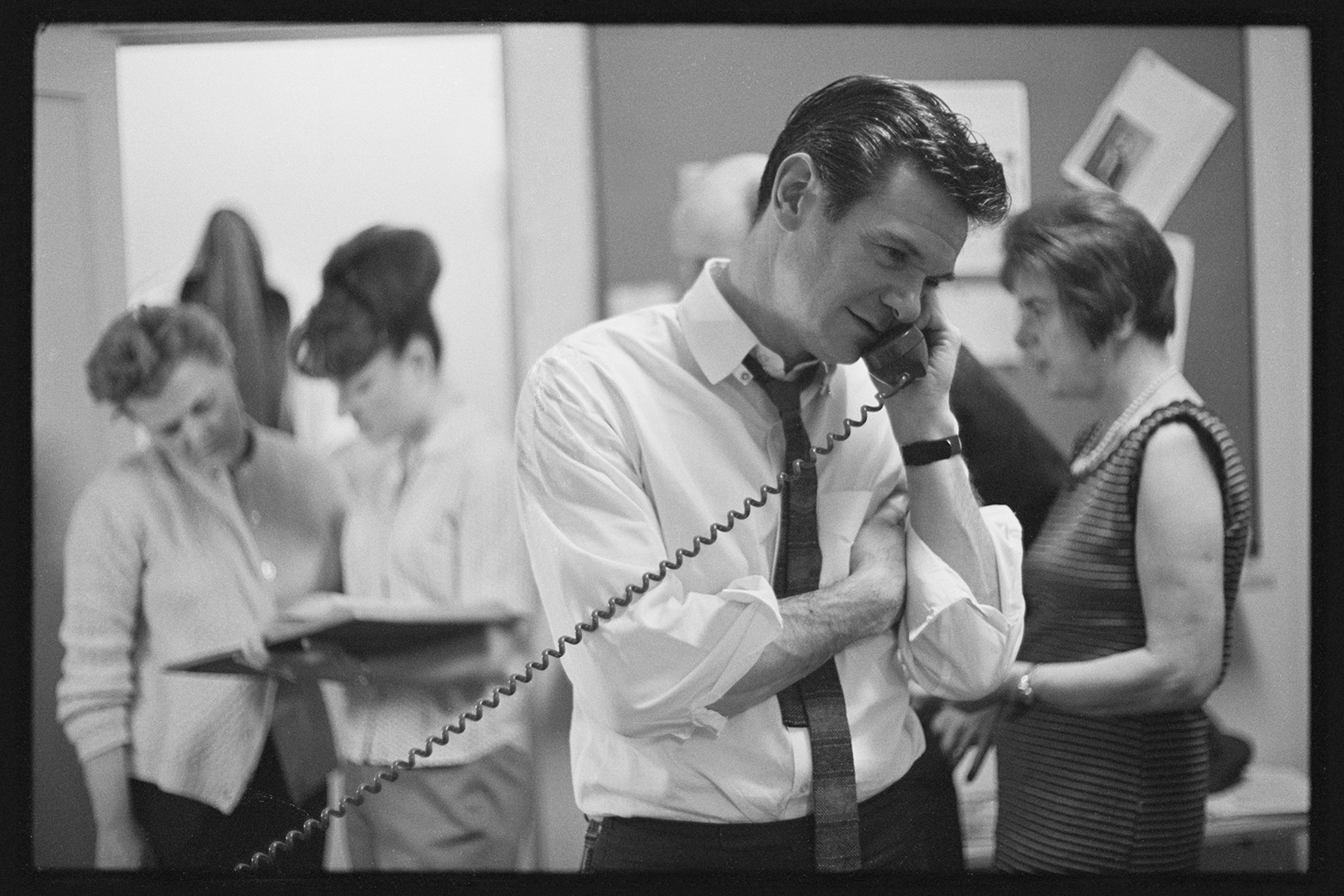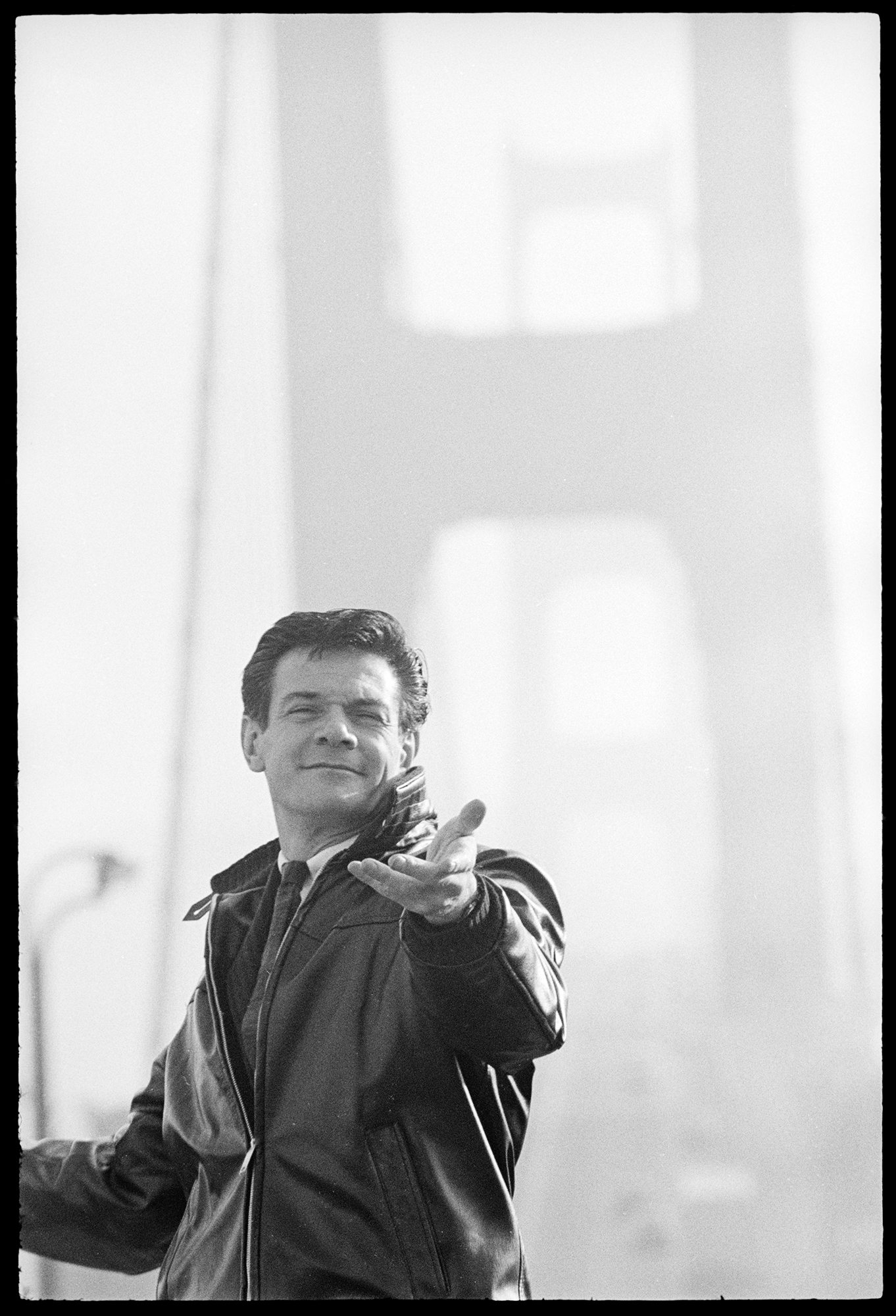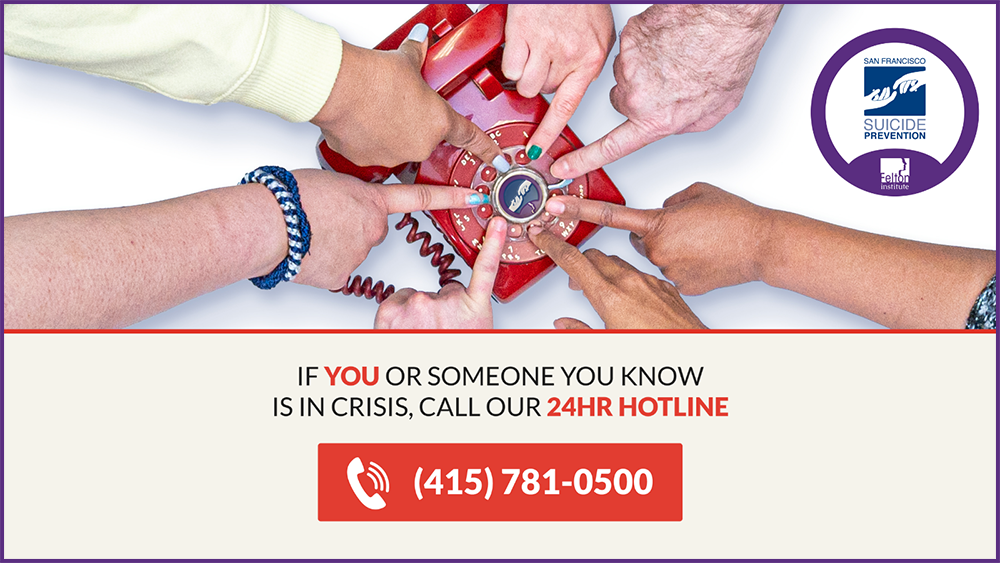In 1962, a red telephone in the basement of a Polk Street tattoo parlor in San Francisco became a lifeline for those contemplating suicide. Answering the distressed callers was Bernard Mayes, a gay, British Episcopalian priest and correspondent for the BBC. Alarmed at the rise of suicides in the city, Mayes responded by creating the nation’s first suicide prevention hotline: San Francisco Suicide Prevention (SFSP).

“I did feel that what was really needed was a compassionate ear, someone to talk to,” Mayes told the San Francisco Chronicle in 2012. “It occurred to me that we had to have some kind of service which would offer unconditional listening, and that I would be this anonymous ear,” he concluded.
In the sixty years since Mayes engaged his first caller, SFSP has continued its commitment to serving those experiencing suicidal ideation, and has extended its reach to serve the vulnerable, underserved, and disenfranchised populations of San Francisco undergoing mental health crises. The hotline provides 24/7 emotional support; evidenced-based counseling; suicide prevention training and outreach; peer-led grief groups; and supportive interventions that provide options to those in crisis, with the goal of reducing suicides and self-destructive behaviors. In addition, SFSP partners with the local Department of Public Health and Mayor’s Office to coordinate an adequate crisis response for the City and County of San Francisco.
In 2019, SFSP merged with Felton Institute, which has been providing cutting-edge, evidence-based social services for over 130 years. The joining of these two historic organizations has provided invaluable resources and support to the community of San Francisco. Prior to this union, the road to SFSP was paved with a non-profit, grassroots approach, with half of its funding coming from local donors. As a program of Felton, SFSP has access to a wealth of mental health counselors trained in evidence-based mental health services.
Addressing Need with Creativity and Caring
 SFSP began with community engagement. Mayes hit the streets of San Francisco, handing out flyers with information about the hotline. He also advertised on city buses. The short but powerful wording that weaved its way through traffic read “Thinking of ending it all? Call Bruce, PR1-0450, San Francisco Suicide Prevention.” Bruce was a pseudonym for Mayes.
SFSP began with community engagement. Mayes hit the streets of San Francisco, handing out flyers with information about the hotline. He also advertised on city buses. The short but powerful wording that weaved its way through traffic read “Thinking of ending it all? Call Bruce, PR1-0450, San Francisco Suicide Prevention.” Bruce was a pseudonym for Mayes.
Setting up the hotline came with its fair share of challenges. Mayes traversed San Francisco looking for a place to house the operations of the hotline but was continually met with rejection. Finally, he caught a break with a local property owner in the then-gay district of town, Polk Street. He later recalled telling the landlord, “I’m looking for a room where I’m going to start a service where we talk to people who might be considering suicide.” The manager, Mayes continued, rolled up his sleeves and asked, “You mean like this?” Extending his arms, Mayes saw slash marks across both wrists. The man rented the space to Mayes for half the price.
SFSP would soon grow, responding to the ever-increasing number of callers reaching out for support. Initially, Mayes trained an all-volunteer staff to take calls, and then, in 1972, SFSP began receiving funding from the City and County of San Francisco, enabling the hotline to hire an actual staff. In the decades since, the organization has evolved and flourished responding to the needs of the community, continuing with a large group of volunteers complimented by a small, permanent workforce.
SFSP has borne witness and responded to various social crises over the years. It introduced the Drug and Alcohol hotline in 1976, launched the HIV Nightline in 1986 and created the HIV/AIDS Nightline in 1989. The HIV/AIDS Nightline’s name was coined due to calls coming in from patients who were awake at night because of inadequate treatment options and medications that needed to be taken every four to six hours, which contributed to painful and sleepless nights. Most recently, SFSP has rolled out three text-based programs: the HIV Nightline chat, the General Crisis line and Youth text services.
SFSP provided the blueprint for responding to the needs of those experiencing a mental health crisis and suicidal ideation. Hundreds of similar hotlines have been set up in every county across the country, including the National Suicide Prevention Hotline. Present day, the organization is continuing to evolve and is embracing the new challenges of the 988 line, formerly the National Lifeline. As ever, SFSP is here to answer the call.
With over two hundred trained volunteers, Felton Institute’s SFSP continues to provide suicide prevention and crisis intervention services to callers. What began with one phone call in a tattoo parlor, has expanded to approximately 55,000 calls annually. Handling calls with compassion and care, volunteers and staff also facilitate additional programs that serve the community. They educate, train, and reach out to community partners such as the SF Police Dept., 911 dispatch, the SF Fire Department, community-based mental health organizations and local colleges such as UCSF, SF State and UC Berkely. Volunteers and staff do youth outreach and in-class suicide prevention training in the San Francisco School District. Volunteers and staff also administer peer-led grief support groups and consult with local media. And finally, staff use their clinical suicide and crisis expertise on subcontracted overnights, weekends and holidays for the DPH Behavioral Health Access Line and for overflow control for the Central Coast Suicide Prevention Hotline.

When the pandemic hit in 2020, SFSP adapted to shelter-in-place protocols through the development and installation of new cloud-based systems to continue our work as a major lifeline to those isolated during lockdown and experiencing mental health issues. To adapt to safety and confidentiality protocols, SFSP upgraded to a secure, cloud-based calling system, allowing volunteers and staff to respond to crisis calls from home, in compliance with shelter-in-place guidelines. And just this year, the 988 Suicide and Crisis Lifeline was launched nationwide. The three-digit number makes it easier for those experiencing a mental health crisis to reach out for help. Continuing the commitment to serving those in need, SFSP will field local calls that come in from 988.
Bernard Mayes had the compassion and foresight to found the nation’s first suicide prevention hotline. Reflecting on the early years of SFSP, Mayes said the hotline “almost worked by magic.” His legacy of compassion continues with the partnership between SFSP and Felton Institute. Mayes, who died in 2014 at the age of 85, provided a lifeline to those who reached out for help. Felton Institute is honored to be part of the continued commitment to community engagement, mental health, and suicide prevention services.
If you’d like to learn more about Felton’s San Francisco Suicide Prevention (SFSP) Programs you can visit our program page or website at sfsuicide.org.
About Felton Institute: Founded in 1889, Felton Institute responds to human needs by providing cutting edge, evidence-based mental health and social services that transform lives. Felton Institute is a tax-exempt organization registered 501(c)(3) nonprofit under EIN 94-1156530.
Offering more than 50 acclaimed and honored programs that address homelessness, mental health, prenatal, adolescent, adult and senior needs, Felton Institute provides services in San Francisco, Alameda, San Mateo, Marin, and Monterey counties.
Felton is named for its social services pioneer and executive director Dr. Katharine “Kitty” Felton who was called the ”conscience of San Francisco” and was committed to ensuring that children and families in crisis have access to social services and resources in order to help them build upon their inherent strengths and develop self-sufficiency. www.felton.org
